Busuu Vs Duolingo: Why A Language Teacher Chose Busuu
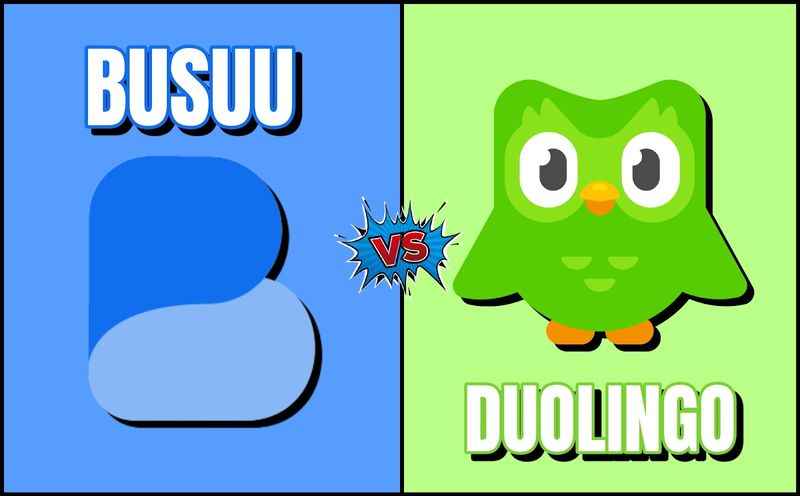
When you hear the term 'language learning app' the first thing that comes to mind is usually Duolingo.
There is a reason for this. Duolingo's marketing efforts have been tremendous throughout the past decade; it's an app that everybody has heard of. Plus, it’s free for all. And let’s be honest, people love access to free content.
But is Duolingo really the best foreign language learning app on the market? In my opinion, it's not even close to being one of the best language learning apps available.
Today, there are thousands of apps available. One that has produced plenty of success stories is Busuu.
Busuu covers a wide array of languages and is known for its comprehensive courses as well as speech recognition features.
In this post, I will show you why I chose to use Busuu to learn German, instead of other popular language learning apps like Duolingo.
Who I am, and How I Did this Review
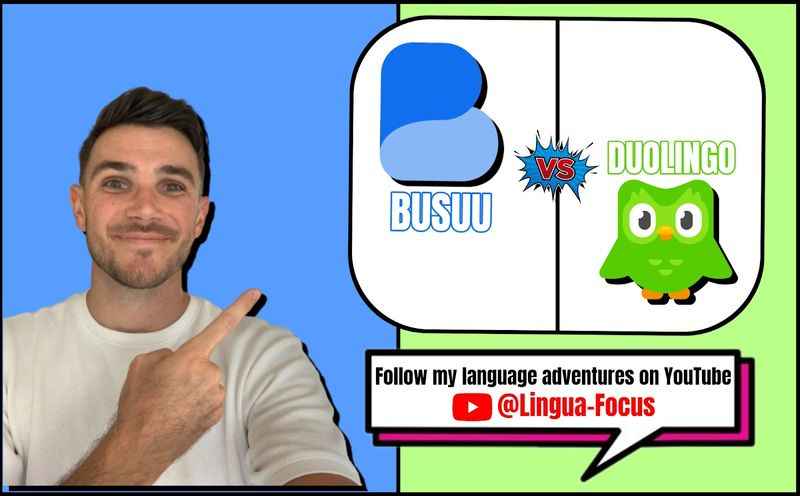
My name is James, and I'm a passionate language enthusiast with over a decade of experience exploring various language learning apps.
Throughout my journey as a language learner, I've delved into a multitude of language learning platforms, each with its unique features and capabilities.
Over the years, I've honed my ability to assess these tools critically and objectively, striving to help fellow language learners make informed decisions.
The motivation behind this review is my unwavering commitment to aiding language learners like myself in their quest to master new languages.
I understand the challenges and frustrations that often accompany language acquisition, and I believe that the right tools can make all the difference.
In this review, I'll share my insights and evaluations of the language learning apps I've encountered, offering an in-depth analysis of their strengths, weaknesses, and suitability for different learners.
My aim is to empower you to choose the perfect language learning app to enhance your linguistic journey and reach your goals.
Duolingo vs Busuu: Overview
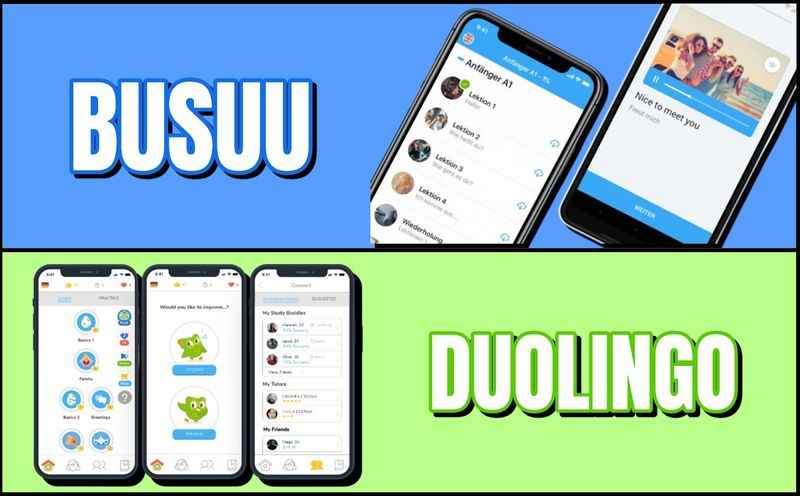
Both of these apps offer rich language learning experiences, and both have their unique strengths.
In this review, I will do my best to explain what sets them apart and why you should consider them for your language learning journey.
As a result, you will be able to understand the similarities and differences between these two apps, and it will make your decision about which to use much easier.
Using Busuu to learn German works better for me, but that doesn't mean it will be perfect for everybody. I prefer a non-gamified approach.
So, read on to find the showdown between Busuu and Duolingo, but remember this is my opinion only.
Busuu vs Duolingo: Which Language Learning App is Better?
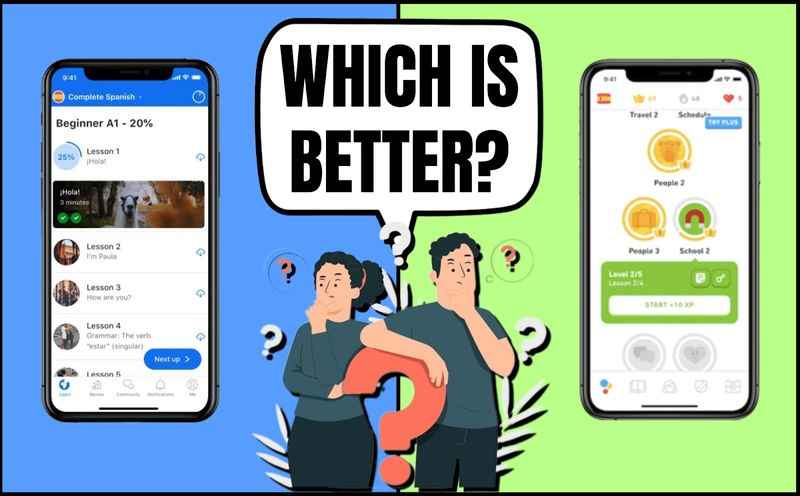
Busuu and Duolingo are both very popular language learning apps.
They certainly share some similarities. Both offer courses in numerous target languages and provide grammar explanations to aid learners.
However, the key differences set Busuu apart. For me, Busuu's emphasis on speaking and writing skills, access to native speakers, and in-depth grammar lessons are what makes it stand out as a stronger option when learning a foreign language.
Like Duolingo, Busuu offers a free version with a wide variety of content and a structured learning path. Duolingo, on the other hand, tends to be more gamified.
Furthermore, the Busuu speech recognition technology and detailed grammar explanations provide learners with a richer, more immersive language learning experience.
So, for those seeking a holistic language education, Busuu shines as the better choice.
Busuu vs Duolingo: How They Work
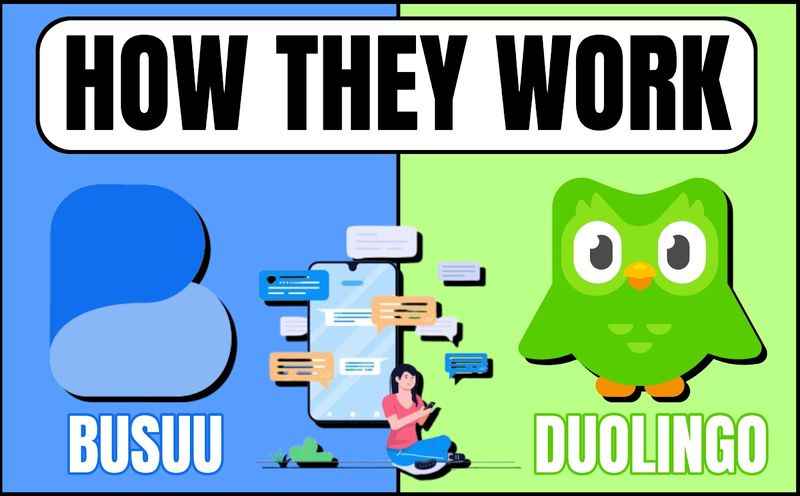
Duolingo and Busuu take distinct approaches to language learning.
Duolingo offers gamified lessons and short daily exercises, while Busuu focuses on in-depth lessons, speaking and writing practice, and access to native speakers.
To quote Busuu themselves, "[With Busuu] learners are able to get real-time feedback on open-ended written and spoken exercises from native speakers. They can also make connections with other language learners for additional practice outside of our structured course content."
Access to real people, not an AI machine, is a game changer when it comes to improvising all your language skills, not just speaking and listening.
How much do these Language Learning Apps cost?
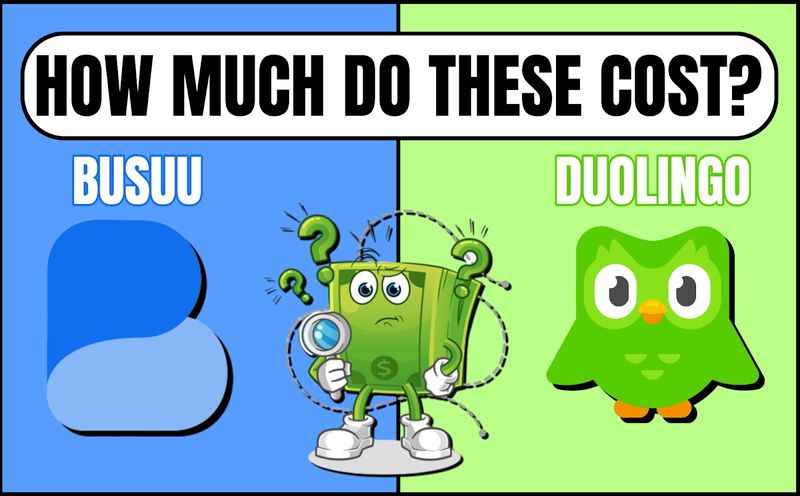
Duolingo is free (which is great for learners on a budget) with optional in-app purchases.
On the other hand, Busuu offers both free and premium plans.
Premium plans vary from $4.87 to $13.95 a month depending on the plan you choose.
Duolingo vs Busuu: Languages Available
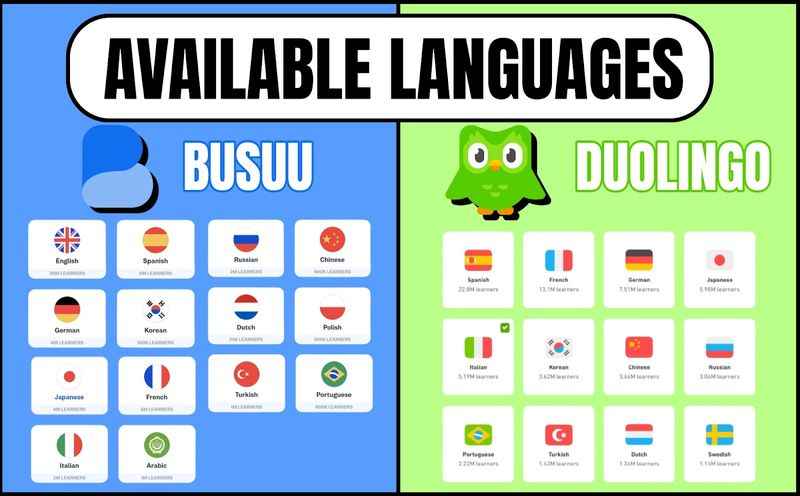
Both apps offer a variety of languages to cater to diverse learners.
Duolingo boasts an impressive selection of languages, including widely spoken ones like Spanish, French, and German, as well as less common choices such as Scottish Gaelic and Navajo.
This extensive offering appeals to learners interested in a broad spectrum of languages.
On the other hand, Busuu provides a range of 12 core languages, including Spanish, French, and German, along with a handful of additional languages like Chinese, Japanese, and Turkish.
While Busuu's selection is more limited compared to Duolingo, it still covers a substantial portion of the world's spoken languages, making it an attractive option for those focusing on specific language goals.
Duolingo vs Busuu: Lesson Structures
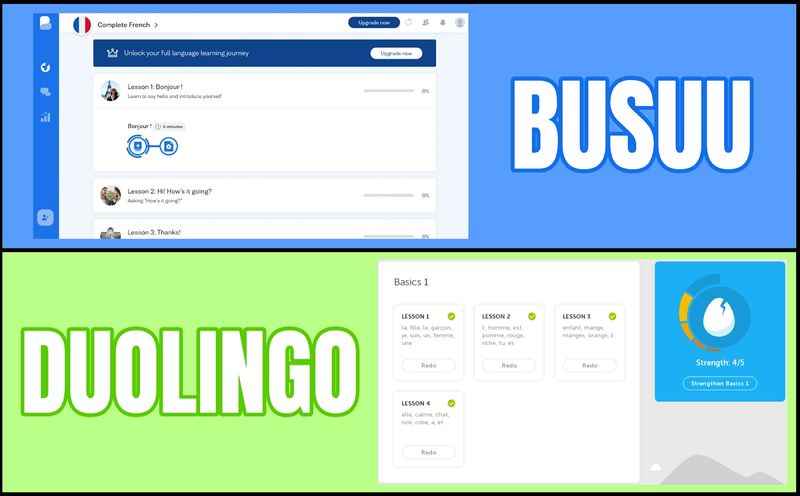
Duolingo and Busuu, as prominent players in the language learning app arena, employ distinct lesson structures to aid learners in their language acquisition journey.
Duolingo offers a gamified approach with short, bite-sized lessons that span a variety of language skills, from vocabulary and grammar to listening and speaking exercises.
The app's unique "tree" structure guides learners through progressively challenging content, encouraging daily practice.
This gamification aspect appeals to users who enjoy a more casual, game-like learning experience.
Busuu, in contrast, adopts a more structured and comprehensive approach. As I mentioned earlier in this review, it's this comprehensive approach that appeals most to me.
With Busuu, lessons are organized into thematic units, focusing on real-world scenarios and practical communication skills.
The platform emphasizes interactive conversations with native speakers, providing personalized feedback on written and spoken exercises.
This approach suits learners seeking a more immersive and context-rich language learning experience.
Ultimately, the choice between Duolingo and Busuu comes down to your preferred learning style and goals – whether you prioritize gamified lessons or structured, immersive language acquisition.
Busuu vs Duolingo For Learning Target Language Vocabulary
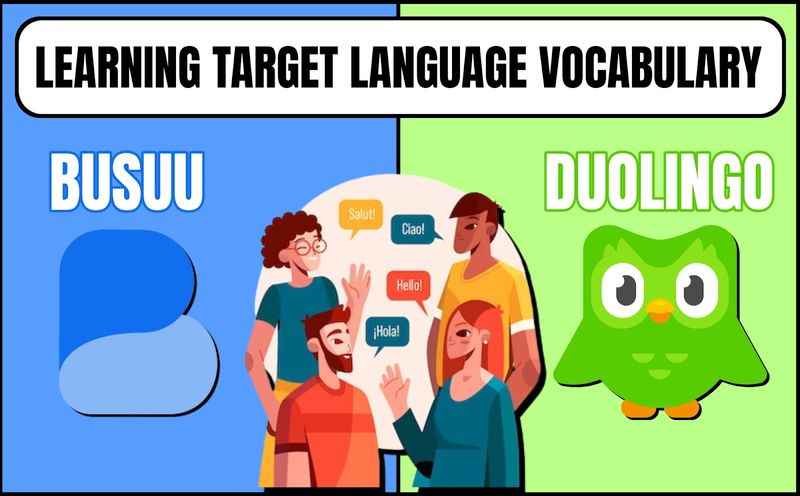
These two language learning apps are very different when it comes to their approach.
Duolingo's Approach
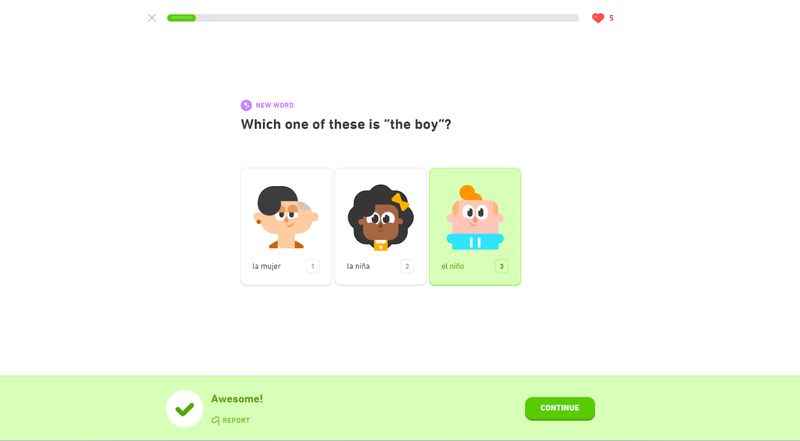
Duolingo offers a playful and gamified approach to vocabulary building.
Through a wide array of lessons and exercises, you'll encounter new words in the context of sentences and phrases.
The app uses repetition and spaced repetition techniques to reinforce your memory.
While Duolingo covers a broad spectrum of languages, it's particularly effective for building a foundational vocabulary.
Busuu's Approach
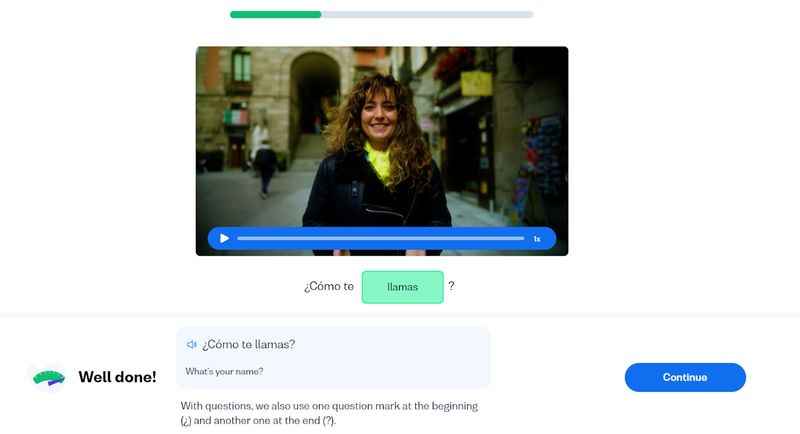
Busuu, on the other hand, takes a more structured and comprehensive approach.
Each lesson is designed to introduce you to a set of new words within a thematic context.
The advantage here is that Busuu offers detailed grammar explanations that help you understand the usage of these words.
It also encourages you to practice the newly learned vocabulary through speaking and writing exercises, ensuring a deeper grasp of the language.
Improving Target Language Speaking Skills
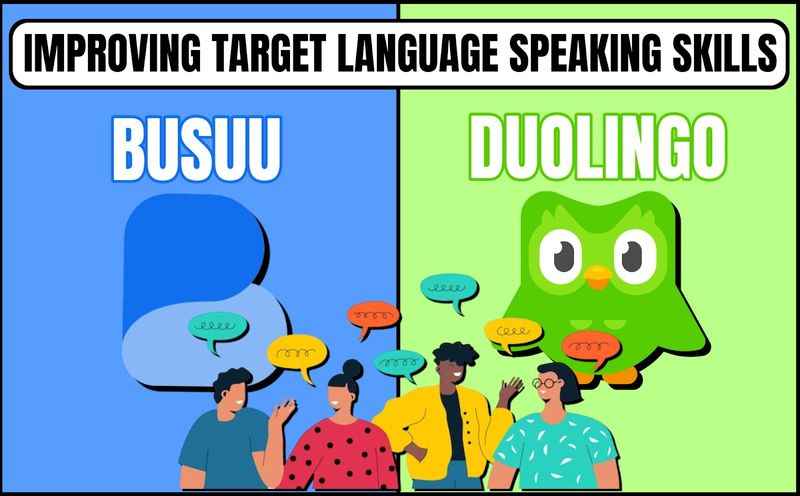
Being able to speak in the target language is usually the primary area of focus for new learners.
In this section, I'll show you how both of these apps can enhance your speaking skills.
The Duolingo Approach
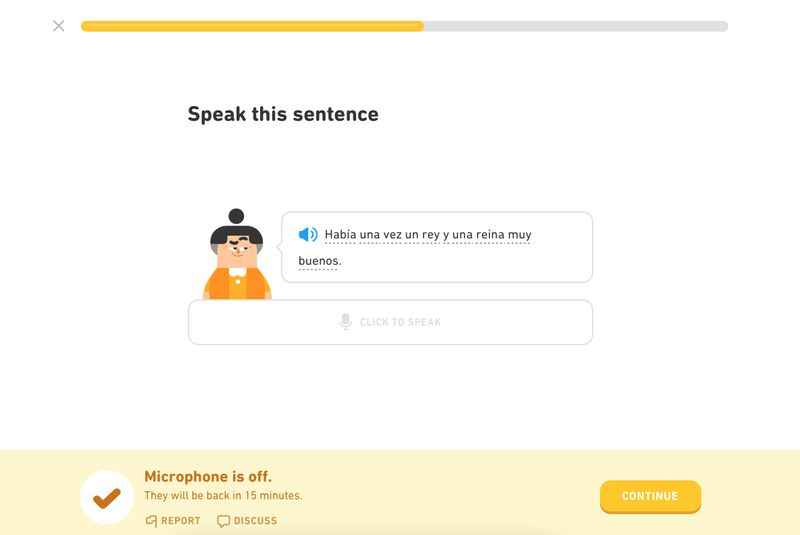
Duolingo offers speaking exercises for practicing pronunciation and listening skills.
It encourages users to speak and match words with their correct pronunciations, laying a foundation for speaking abilities.
While beneficial for beginners and casual learners, I would say that Duolingo's approach does not provide the depth needed to attain advanced proficiency in any spoken language. It's merely a beginner tool.
The Busuu Approach

By contrast, Busuu places a stronger emphasis on speaking skills, making it a favorable choice for those who aspire to become proficient speakers.
The app offers opportunities to engage with native speakers, receive feedback, and participate in interactive speaking exercises.
This immersive approach allows you to gain confidence and fluency in a new language.
Which is Most Effective?
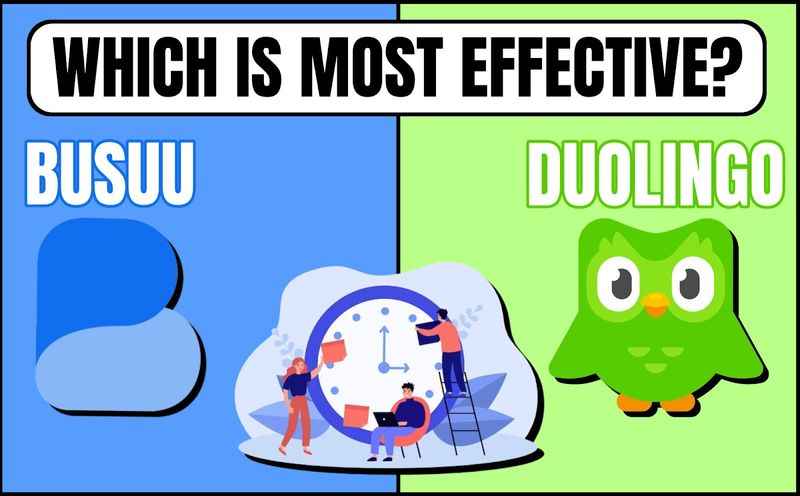
For learners prioritizing speaking skills, Busuu's approach is more comprehensive.
Its inclusion of native speakers and interactive exercises is invaluable for developing conversational proficiency.
While Duolingo offers basic speaking exercises, Busuu's approach is better suited for those aiming to reach a level in which they are able to converse comfortably in a new language, rather than learn new words and phrases.
Busuu vs Duolingo: Which is Better for Beginners?

When it comes to deciding between Busuu and Duolingo for beginners, I would say that choice is contingent on your generation and preferred learning style.
In my view, Busuu stands out as the preferable option for several compelling reasons. Its comprehensive and immersive approach offers a well-rounded language learning experience, catering to those who seek an in-depth understanding.
Nevertheless, it's essential not to disregard Duolingo's charm for beginners.
Its gamified format injects an element of enjoyment into the learning process, while its brief daily exercises are manageable, making it an ideal stepping stone for casual learners.
For novice language learners, a practical strategy might involve giving both Busuu and Duolingo a try.
Busuu's comprehensive approach may resonate with those desiring a deeper understanding, while Duolingo's gamified style could attract those who appreciate a more relaxed learning atmosphere.
In a world where learning preferences can vary widely across generations, with Gen Z embracing a more casual approach, and millennials like myself leaning towards a more in-depth method, experimenting with both platforms can assist in determining the one that best aligns with your unique learning style and goals.
Busuu is based on CEFR Levels (Duolingo is not)
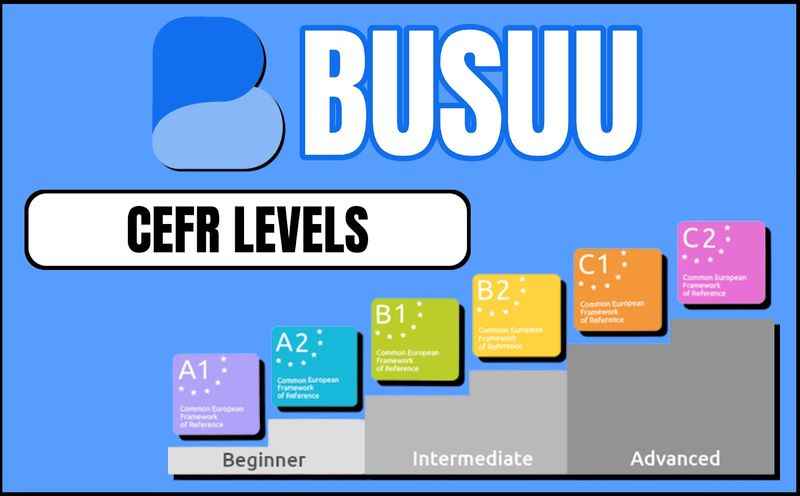
The Common European Framework of Reference for Languages (CEFR) is a widely recognized system for assessing language proficiency.
These certificates are often recognized by educational institutions and employers as a way to assess language skills. Busuu's language courses all cover the first four stages of the CEFR, from A1 to B2 level.
Unlike Duolingo, Busuu offers the opportunity for users to earn CEFR level certificates, which makes it a great choice for any learners who want to validate their language abilities.
After all, these certificates attest to your language proficiency and are a valuable addition to your résumé or academic credentials.
When trialing the app, I realized that with Busuu, you can take an assessment to determine your CEFR level and then work through their courses to improve and ultimately obtain a certificate that demonstrates your language skills at that level.
Whether you're learning a language for personal growth or professional advancement, a CEFR certificate from Busuu can be a valuable recognition of your linguistic accomplishments.
How Exactly Does Busuu Work?
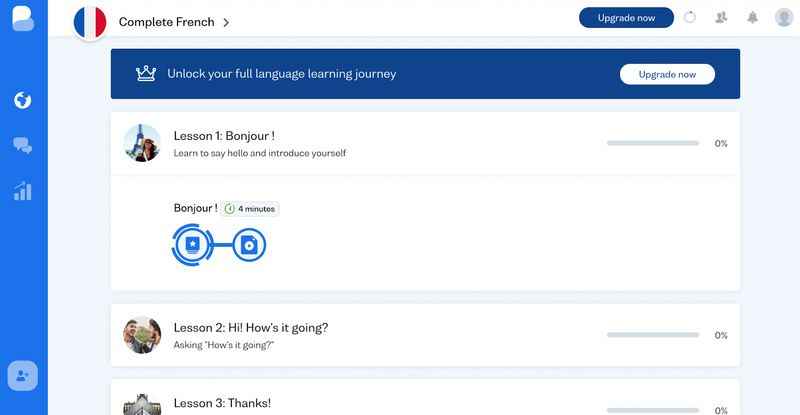
The Busuu app operates as a comprehensive language learning platform, offering a structured curriculum that covers various languages.
I found its main draw to be the interactive lessons, which immerse learners in real-life contexts and offer instant feedback from native speakers.
Busuu's engaging exercises, grammar explanations, and speaking/writing practice foster a well-rounded language experience.
Its main draw is the depth of content and access to a community of native speakers, making it an excellent choice for those seeking a holistic and interactive language learning journey.
Get Corrected By A Native Speaker
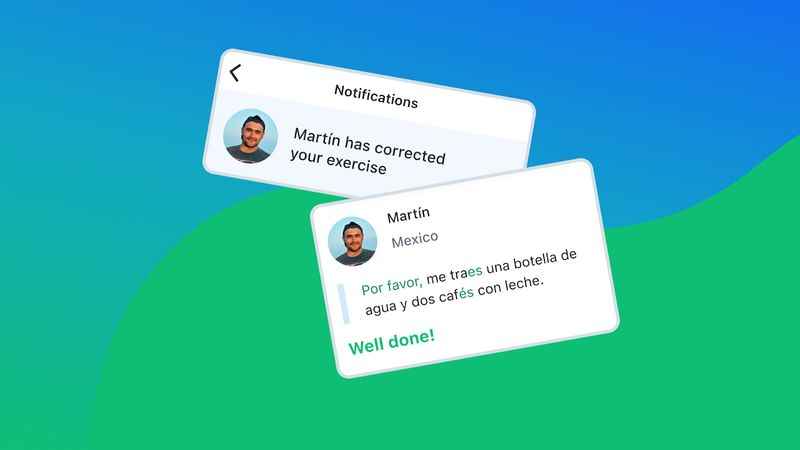
In the Busuu app, a standout feature is the opportunity to "Get Corrected By A Native Speaker."
This means that as a learner, you can submit written and spoken exercises, and they'll be reviewed and corrected by native speakers.
This direct feedback is invaluable, helping you fine-tune your pronunciation, grammar, and overall language proficiency.
This is something that makes the learning process personalized, effective, and more akin to real-world language interactions, a key benefit for language learners.
How languages are taught with Busuu (Lesson Format)
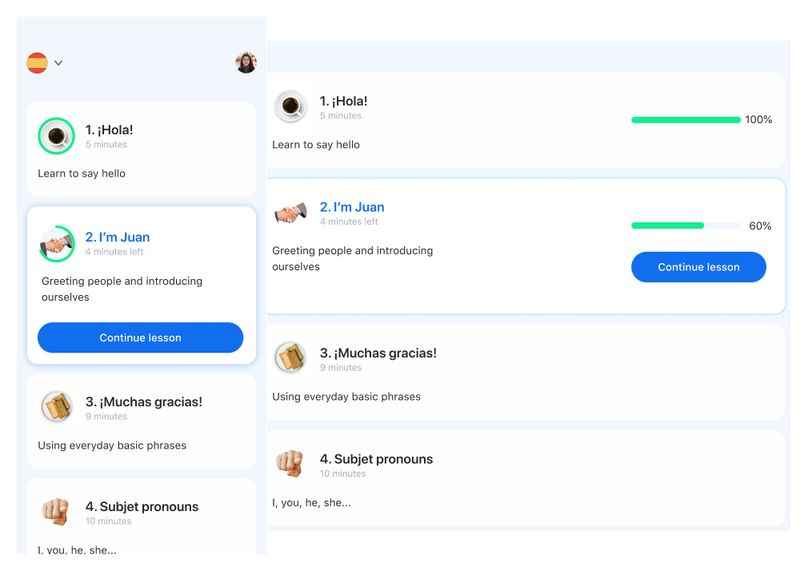
Busuu's language lessons are structured to provide a well-rounded language learning experience.
A typical lesson consists of a conversation or scenario in the target language, introducing new vocabulary and grammar rules.
Learners then engage in interactive exercises, like matching, fill-in-the-blanks, and speaking tasks, to reinforce their understanding.
The lesson wraps up with a review section to consolidate what's been learned.
This format ensures that learners not only grasp the language conceptually but also apply it in practical contexts, making each lesson engaging and effective.
The Busuu Free Version Vs. Premium Version
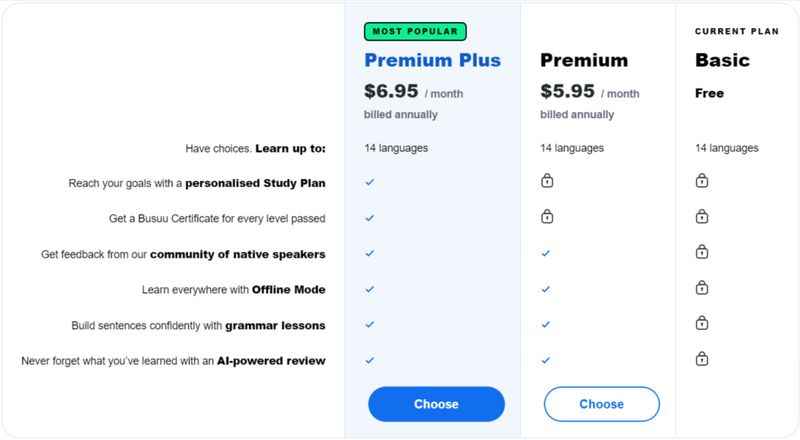
Busuu's free version offers a decent introduction to language learning, providing access to interactive lessons, vocabulary review, and some speaking exercises.
It's ideal for casual learners and those exploring the app.
However, there are limitations, such as restricted content and the absence of advanced features like speech recognition and offline mode. That is why I decided to start with a paid plan right away.
Paid plans come with the following benefits:
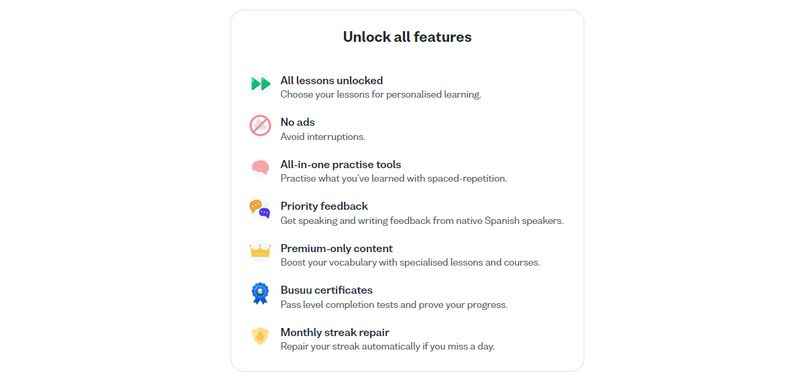
- All lessons unlocked
- Choose your lessons for personalised learning
- No ads
- Avoid interruptions
- All-in-one practise tools
- Practise what you’ve learned with spaced-repetition
- Priority feedback
- Get faster speaking and pronunciation feedback from the community
- Premium-only content
- Boost your vocabulary with specialised lessons and courses
- Busuu certificates
- Pass level completion tests and prove your progress
- Monthly streak repair
Opting for a paid plan grants access to comprehensive courses, in-depth grammar explanations, and offline mode, providing a more immersive learning experience.
Premium also unlocks the full potential of the app, making it a worthwhile investment for serious language learners aiming for proficiency.
Access to the Busuu Community
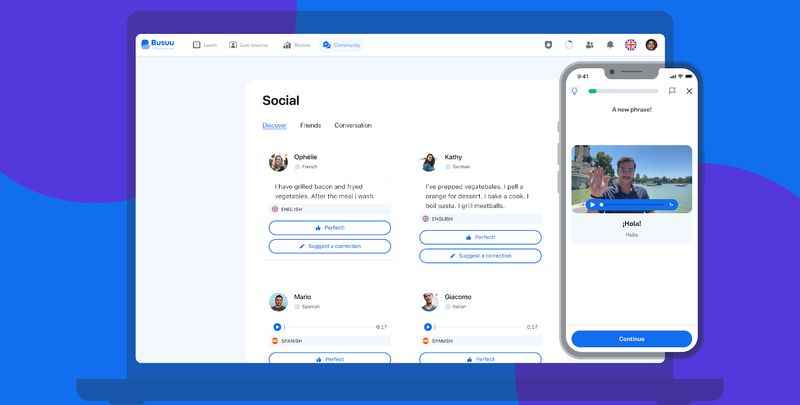
When using the Busuu language app, I discovered that the Busuu community is an integral part of the Busuu language learning platform.
It refers to a global network of language learners and speakers who use Busuu to improve their language skills, learn vocabulary etc.
Within the Busuu community, users have the opportunity to interact with and learn from native speakers and other learners from around the world.
Key features of the Busuu community include:
Language Exchange: Users can connect with native speakers of the language they are learning for conversational practice, helping them improve their speaking and listening skills.
Feedback and Corrections: Users can submit written and spoken exercises for review by native speakers and experienced learners, receiving valuable feedback and corrections to enhance their language proficiency.
Community Support: The Busuu community offers a supportive environment where learners can ask questions, seek advice, and share their language learning experiences.
Cultural Insights: Interacting with native speakers and fellow learners provides opportunities to gain cultural insights and a deeper understanding of the language.
The Busuu community fosters a collaborative and immersive learning experience, enriching the language learning journey and helping users achieve their language goals more effectively.
FAQs: Busuu Vs Duolingo
I hope you've found the review so far helpful. This frequently asked questions section is designed to provide clarity on the features, functionality, and benefits of both Busuu and Duolingo.
Duolingo vs Busuu: Which One Is Better?
The answer to this depends on your learning style and goals. Duolingo is more gamified and beginner-friendly, while Busuu offers deeper content and immersion, making it preferable for comprehensive learning.
Duolingo vs Busuu, what are the prices?
Both apps offer free versions, with Busuu offering a more structured free plan. Premium pricing varies, but generally, Busuu is considered costlier due to its extensive features.
Can you become fluent with Busuu?
Busuu can take you to a high level of proficiency but achieving fluency depends on your dedication and practice outside the app, engaging with native speakers and real-life language experiences.
Is Busuu enough to learn a language?
Busuu can take you to a high level of proficiency but achieving fluency depends on your dedication and practice outside the app, engaging with native speakers and real-life language experiences.
Is Busuu enough to be fluent?
Busuu provides a robust foundation and proficiency, but full language acquisition might require supplemental learning methods and real-world practice.
Are Busuu certificates official?
Busuu provides CEFR-aligned certificates for certain languages, which are recognized by some educational institutions and employers. However, official recognition may vary.
Can Busuu really get you to B2?
Busuu's structured content and speaking practice can certainly help learners achieve a B2 level of proficiency, but it also depends on individual effort and practice. Reaching B2 typically involves a combination of learning resources and real-world practice.
Is Busuu certificate free?
Busuu offers both free and paid versions of its certificates. The availability of free certificates may vary, depending on the specific language and the extent of the app's offerings for that language.
Do Busuu and Duolingo offer new users a placement test?
Yes, both Busuu and Duolingo offer a placement test for new users. These placement tests are designed to assess your current language proficiency and knowledge so that you can begin your language learning journey at an appropriate level.
Summing Up This Review of Busuu vs Duolingo
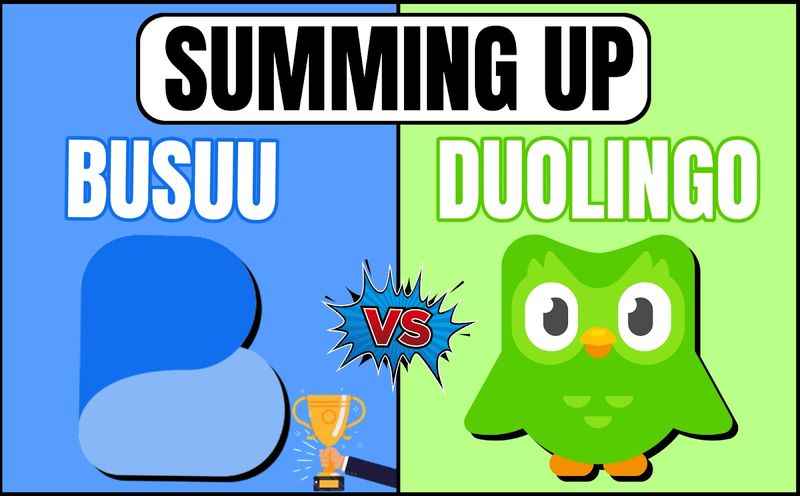
As a language learning specialist, I've highlighted the merits of Busuu that resonate with my expertise and preference.
I've made my preference clear, but your choice should always be guided by your language learning objectives.
Duolingo excels in catering to casual learners and beginners, making language acquisition accessible and enjoyable. It is better than many language apps on the market.
On the other hand, Busuu distinguishes itself by providing a deeper and more comprehensive learning experience, emphasizing structured lessons, speech recognition, and interactive exercises.
The real-world language immersion and feedback from native speakers set Busuu apart.
For those who aspire to embark on a well-rounded and in-depth language learning journey, Busuu's emphasis on practical proficiency and its extensive content make it the superior choice.







